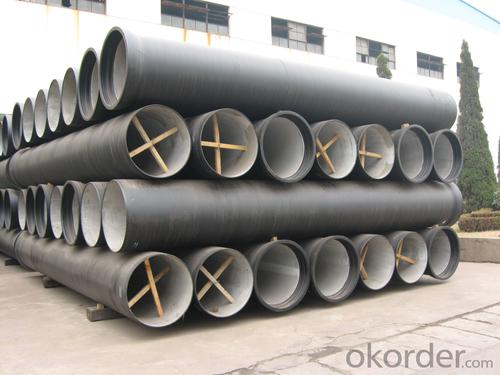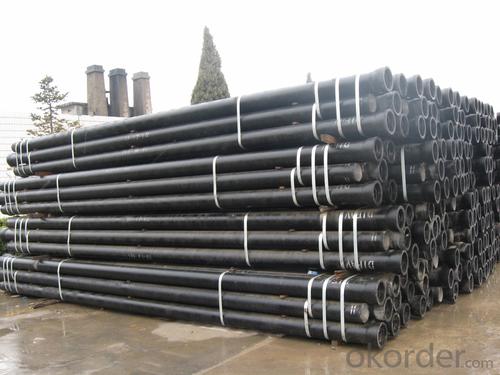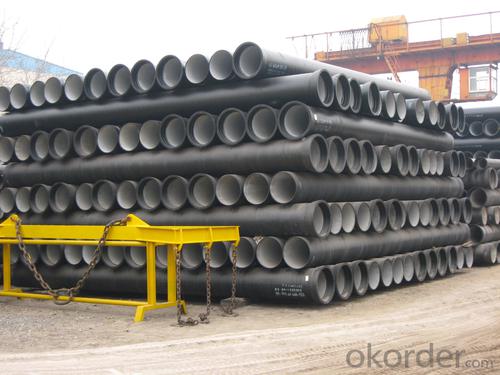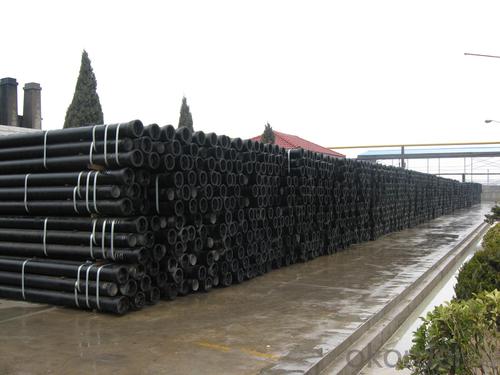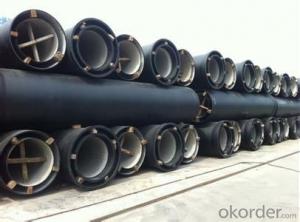DUCTILE IRON PIPE DN1200 K8/C/K9
- Loading Port:
- China Main Port
- Payment Terms:
- TT OR LC
- Min Order Qty:
- -
- Supply Capability:
- -
OKorder Service Pledge
OKorder Financial Service
You Might Also Like
Specification:
1) The standard of pipe: ISO2531:1998, K9
2) Effective length: 6m
3) Inner cement line: Portland cement line as per ISO4179
4) Zinc coating: at least 130g/m2 as per ISO8179
5) Bitumen painting: at least 70um as per ISO8179
6) With 100% quantity of NBR ring, or SBR ring, or EPDM ring as per ISO4633
7) DN80mm-800mm
8) High strength, lighter than grey iron, good corrosion resistance, no furring, small flow resistance, easy fixing, long life tome about 100 yeas
9) Produced by Hangzhou chunfeng machine
10) Checked by automatic inspection equipment
11) Composition:
Chemical composition | | | | |||
Chemical composition | Ductile Cast Iron Pipe (%) | Grey iron pipe (%) | Steel pipe (%) | | | |
C | 3.5-4.0 | 3.2-3.8 | 0.1-0.2 | | | |
Si | 1.9-2.6 | 1.4-2.2 | 0.15-0.4 | | | |
Mn | 0.15-0.45 | 0.4-0.6 | 0.3-0.6 | | | |
P | ≤0.06 | ≤0.3 | 0.02-0.03 | | | |
S | ≤0.02 | ≤0.1 | 0.02-0.03 | | | |
Mg | 0.03-0.06 |
|
| | | |
12) Feature:
Mechanical properties | | | | |||
| Ductile Cast Iron Pipe | Grey Iron Pipe | Steel Pipe | | | |
Tensile Strength(Mpa) | ≥420 | 150-260 | ≥400 | | | |
Yield Strength(Mpa) | ≥300 | No Confirmation | No Confirmation | | | |
Bending Strength(Mpa) | ≥590 | 200-360 | ≥400 | | | |
Elongation (%) | ≥10 | Neglected | ≥18 | | | |
Brinell Hardness(HBS) | ≤230 | ≤230 | About 140 | | | |
13) T type mechanical joint
14) Packing: in bulk or container
- Q: What's the difference between grey cast iron pipe and ductile iron pipe?
- Ductile iron pipe is a kind of casting alloy developed in the late 1940s. It is a kind of spheroidal graphite cast iron which is added into the molten iron by adding inoculant and inoculant. The mechanical properties of spherical graphite, so much more better than that of grey cast iron, cast iron, close to the steel, but the price is lower than steel, and still has many excellent properties of ordinary cast iron, such as good casting, shock absorption, machinability and low notch sensitivity etc.. Therefore, many important mechanical parts, such as crankshaft, connecting rod, gear, valve body and cylinder liner, can be made of ductile iron to save steel and reduce cost.
- Q: Can ductile iron pipes be used for above-ground installations?
- Ductile iron pipes are capable of being utilized for installations above the ground. Ductile iron, a form of cast iron, possesses enhanced tensile strength and flexibility, rendering it appropriate for a wide range of applications, including installations above the ground. It is commonly employed in water distribution systems, sewage systems, and industrial pipelines. Ductile iron pipes exhibit resistance to corrosion, can endure high pressure and temperature, and boast an extended lifespan. They are additionally accessible in various sizes and can be effortlessly linked using diverse types of joints. However, it is imperative to guarantee adequate support and safeguard against external elements like sunlight and impact to avert any potential harm.
- Q: Is the spigot and socket connection of the ductile iron tube reversed?
- The whole process is formed by the radial compression of the pipe blank and the stretching process of the branch pipe. Different from the hydraulic bulging three, the metal of the three way joint pipe is compensated by the radial movement of the tube blank, so it is also called radial compensation process.
- Q: What is the expected bending stress capacity of ductile iron pipes?
- Ductile iron pipes exhibit varying expected bending stress capacities due to factors such as diameter, wall thickness, and the grade of ductile iron utilized. However, in general, ductile iron pipes possess superior bending stress capacities compared to alternative pipe materials. Ductile iron pipes are renowned for their remarkable tensile strength and flexibility, enabling them to endure substantial bending stresses. Determining the precise bending stress capacity involves comprehensive testing and analysis, taking into account the pipe's mechanical properties, dimensions, and maximum allowable deflection. It is crucial to evaluate the bending stress capacity of ductile iron pipes in accordance with established industry standards and guidelines. These may involve standards like the American Water Works Association (AWWA) C150 or the International Organization for Standardization (ISO) 2531, which outline specifications and testing methodologies for ductile iron pipes. Ultimately, the anticipated bending stress capacity of ductile iron pipes hinges upon various factors and necessitates an assessment tailored to the specific application requirements. It must consider industry standards and guidelines to ensure precise and dependable results.
- Q: Can ductile iron pipes be used in gravity sewer systems?
- Ductile iron pipes find great utility in gravity sewer systems. Renowned for their robustness and durability, they are extensively employed in diverse applications, including sewer systems. Boasting exceptional corrosion resistance, they can withstand immense pressure and heavy burdens. Moreover, their flawlessly smooth interior surface curtails friction and enhances the transportation of waste and wastewater. Consequently, they emerge as an ideal option for gravity sewer systems, where the seamless flow of sewage hinges upon gravity to traverse the pipes.
- Q: How can the cast iron pipe of the ductile iron pipe be repaired?
- First of all, to see whether the manufacturers do elbow pressure did not reach, if it is. That can only be replaced, if not, with a cast iron electrode welding repair.By the way, ductile iron can only be welded and not welded.
- Q: What does "K8" mean in ductile iron pipe grades?
- 1 ductile iron pipe grade K8, on behalf of the ductile iron 8 grades, K refers to the wall thickness coefficient, the higher the grade, the greater the pressure, the lower the level, the less pressure to bear.2 wall thickness calculation formula: e=K (0.5+0.001DN).
- Q: Can ductile iron pipes be used for dam construction?
- Indeed, dam construction can utilize ductile iron pipes. Renowned for their robustness, longevity, and resistance to corrosion, these pipes prove apt for various purposes, including the construction of dams. They exhibit remarkable resilience under intense pressure, rendering them perfect for transporting water and other fluids throughout the dam's framework. Moreover, their capacity to withstand external forces and ground shifts establishes them as a dependable option for dam construction. Furthermore, the relative ease of installation and maintenance of ductile iron pipes enhances their appropriateness for dam construction endeavors.
- Q: Can ductile iron pipes be used for marine applications?
- Yes, ductile iron pipes can be used for marine applications. Ductile iron has excellent corrosion resistance properties, making it suitable for use in marine environments where exposure to saltwater and other corrosive elements is common. Additionally, its high strength and durability make it a reliable choice for various marine applications such as seawater intake and discharge systems, offshore platforms, and marine pipelines.
- Q: Can ductile iron pipes be used for wastewater treatment plants?
- Yes, ductile iron pipes can be used for wastewater treatment plants. Ductile iron pipes are known for their strength and durability, making them suitable for handling the harsh and corrosive environment of wastewater treatment plants. These pipes can withstand high pressures and are resistant to corrosion, which is essential in handling wastewater and various chemicals involved in the treatment process. Ductile iron pipes also have the advantage of being easy to install and maintain, with a long service life. Therefore, they are commonly used in wastewater treatment plants for transporting and distributing wastewater throughout the facility.
Send your message to us
DUCTILE IRON PIPE DN1200 K8/C/K9
- Loading Port:
- China Main Port
- Payment Terms:
- TT OR LC
- Min Order Qty:
- -
- Supply Capability:
- -
OKorder Service Pledge
OKorder Financial Service
Similar products
Hot products
Hot Searches
Related keywords




